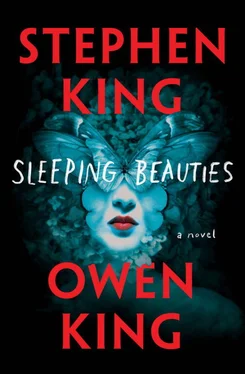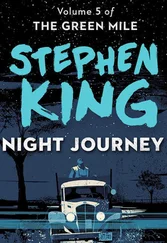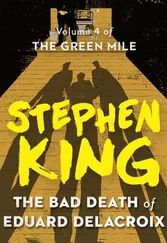2
For Blanche, there was a happy ending.
She awoke in Dorothy’s apartment, on the floor where she had fallen asleep a few days before, and peeled herself out of the remains of her decaying cocoon. Her friends were there, too, likewise coming around and tearing themselves free. But one thing was different: Andy Jones. The baby was not in Blanche’s arms, as he had been when she entered the Tree. He was asleep in a crude crib made of woven twigs on the floor nearby.
“Holy shit,” Dorothy said. “The kid! Yippee!”
Blanche took it as a sign. Tiffany Jones Daycare was built on the site of a home that had burned down during Aurora. The project was financed from Blanche’s retirement fund, and from that of her new boyfriend (which, in Willy Burke’s case, had been accruing without interest in the lining of his yellowed mattress since 1973), and from many community donations. In the wake of Aurora, it seemed that many more people were charitably inclined than had previously been the case. The Norcross family was particularly generous, in spite of their difficulties. On the sign outside, below Tiffany’s name, was a picture of a crib made of woven twigs.
Blanche and her staff accepted any child between the ages of one month and four years, regardless of the parents’ (or parent’s) ability to pay. After Aurora, it was small community operations like Blanche’s, in large part funded and staffed by men, that began the movement that led to the establishment of a universal childcare program. Many men seemed to understand that a rebalancing was necessary.
They had, after all, been warned.
Blanche thought once or twice of the novel they had met to talk about on that last night before everything changed: the story of a girl who told a lie that changed many lives. Blanche often considered the penance that weighed so heavily on that girl’s life. She, Blanche, did not feel that she owed any such penance. She was a decent person, had been a decent person all along, a hard worker and a good friend. She had always been good to the inmates of the prison. The daycare was not about atonement. It was about decency. It was natural, obvious, and essential. If the boardgame was missing pieces, it was sometimes—often, even—possible to make new ones.
Blanche had met Willy when he showed up at the door of the daycare, then still undergoing renovations, with a wad of fifty-dollar bills.
“What’s this now?” she asked.
“My share,” he said.
Except it wasn’t. Mere money wasn’t enough. If he wanted to share, he’d have to do his share.
“Kids crap so much,” Willy observed to Blanche one evening after they had been courting for awhile.
She was standing by her Prius, waiting for him to finish dragging two straining, translucent bags of used diapers to the bed of his truck. They would be washed at Tiny Tot Laundry in Maylock. Blanche had no intention of filling a landfill with used Pampers. Willy had lost weight and bought new suspenders. Blanche had thought he was cute before, but now, with his beard trimmed (and those pesky eyebrows), he was downright handsome.
“If you die on me, Willy,” said Blanche, “we’re going to have fun with the obituary. ‘Willy Burke died doing what he loved. Transporting poopy diapers across a parking lot.’ ” She blew him a kiss.
3
Jared Norcross volunteered at Tiffany Jones Daycare the following summer, and part-time during his senior year. He liked helping out. The kids were sort of demented—they made dirt castles and licked walls and rolled in puddles, and that was just when they were happy—but he was endlessly fascinated, like so many before him, at the easy way the boys and the girls played together. So what changed later on? Why did they suddenly split into largely separate playgroups almost as soon as they began organized school? Was it chemical? Genetic? Jared didn’t accept that. People were more complex; people had root systems, and their root systems had root systems. He had an inkling that in college he might like to study child behavior and eventually become a psychiatrist, like his father.
These thoughts comforted Jared and distracted him when he needed distracting, which was, during that period of his life, almost all the time. His parents’ marriage was breaking up, and Mary was dating Molly Ransom’s older cousin, a lacrosse star at a high school in the next county. He had seen them together once, Mary and her guy. They had been sitting at a picnic table outside an ice cream parlor, feeding each other ice cream cones. It could only have been more horrible if they were having sex.
Molly bird-dogged him once, heading out of his house. “What’s going on, dude? Mary and Jeff are coming over. You want to hang with us?” The little girl had braces now, and it seemed like she’d grown about seven feet. Soon the boys who didn’t want to play with her after school would be chasing her for maybe a kiss.
“I wish I could,” Jared said.
“So why can’t you?” Molly asked.
“Broken heart,” Jared said, and winked. “I know you’ll never love me, Molly.”
“Oh, please, get a life,” she said, and rolled her eyes.
Sometimes Jared’s steps carried him past the empty house where he’d hidden Mary and Molly and Mom. He and Mary had been a sweet team, he thought—but she had put all that firmly into the past. “It’s just a whole different world now, you know,” Mary had told him, as if that was any consolation, or explained anything at all. Jared told himself that she had no idea what she was missing, but decided—gloomily—that she probably wasn’t missing anything.
4
Cocoons, it turned out, could float.
Three women, passengers on the flight that had crashed in the Atlantic Ocean, awoke in their webs on a rocky beach in Nova Scotia. Their cocoons were wet, but the women inside them were dry. They walked to an empty rescue station and called directory assistance for help.
This item was relegated to the back pages of newspapers and webzines, if reported at all. In the shadow of that year’s major miracle, such minor ones were of little interest.
5
To find one’s husband dead inside an exhaust-filled garage was a terrible way to return home.
Rita Coombs had some bad moments after that: despair, terror of a single life, and of course her own sleepless nights when it seemed the next day would never come. Terry had been steady, smart, and genial. That he had bogged down in a depression so hideous and encompassing that he had taken his own life was hard to square with her experience of the man who had been her partner and the father of her child. She wept until she was sure all the tears were gone… and then more tears came.
A fellow named Geary visited her one afternoon to offer his condolences. Rita knew—though there were conflicting stories, and a desire to protect everyone involved had thrown a hush over the details of the event—that it was Geary who had directed the attack on the prison, but his manner was soft-spoken and kind. He insisted she call him Frank.
“What happened to my husband, Frank?”
Frank Geary said that he believed Terry just couldn’t bear it. “Everything was out of hand and he knew it. But he couldn’t stop it. The only thing he could stop was himself.”
She gathered herself and asked one of the questions that plagued her on her sleepless nights. “Mr. Geary… my husband… he had a little bit of a drinking problem. Did he… was he…”
“Sober the whole time,” Frank said. He raised his ringless left hand. “My word on it. Hand to God.”
6
Aurora’s mass outbreaks of violence and property damage, plus the disappearance of so many women, resulted in massive restructuring of the insurance industry nationwide and worldwide. Drew T. Barry, and the team at Drew T. Barry Indemnity, rode it out as well as any company in America, and managed to facilitate life insurance settlements for both Nate McGee’s widow and Eric Blass’s parents. Since both had died in the midst of an unauthorized assault on a penal institution, this had been no small feat, but Drew T. Barry was no mean insurance agent.
Читать дальше











